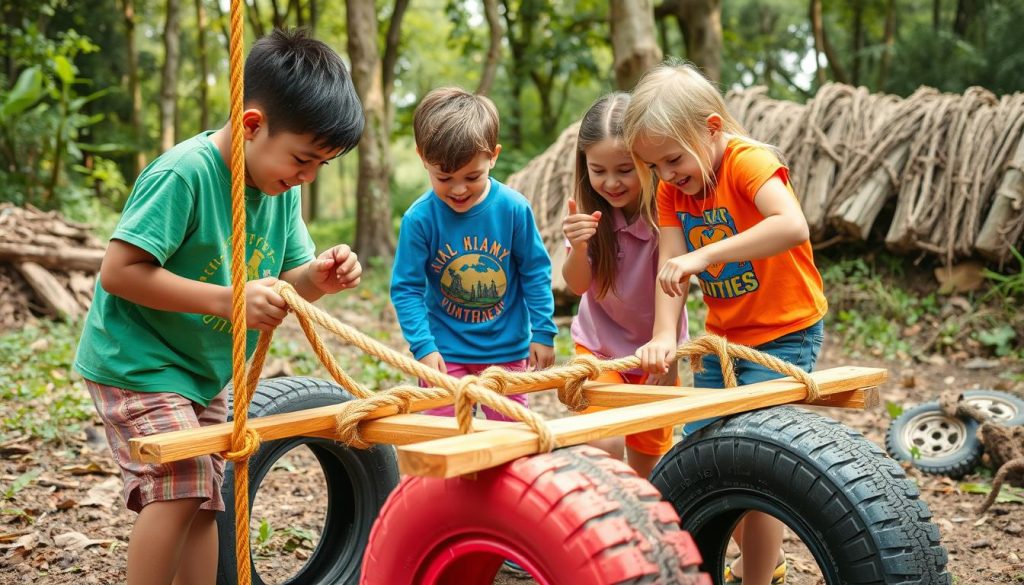
In today’s world, teaching kids to be resilient is more important than ever. Resilience helps kids handle stress, worries, and the unknown. It’s key for their happiness and success. Parents play a big role in this journey. They share tricks and support that shape their children’s growth. By using positive parenting, kids learn to face life’s ups and downs bravely.
It’s during the hard times that kids learn a lot about themselves. So, parents need to offer the right kind of help and chances for their kids to grow12.
Key Takeaways
- Resilience is a skill that can be taught and learned.
- Parenting plays a pivotal role in child development and resilience.
- Providing children with opportunities to navigate challenges fosters independence.
- Positive reinforcement and modeling behavior are effective in building resilience.
- Engaging with children during tough times can enhance their self-discovery.
Understanding Resilience in Children
Resilience in Children is seen as their skill to cope with stress and keep going when things get tough. It’s about being adaptable and solving problems effectively. When problems arise, resilient kids are less likely to run away or act out3. Successfully facing a challenge can make them more confident. This boosts their ability to deal with what comes next3.
Having strong bonds with caregivers is key for a child’s resilience3. When parents understand child development, they can better guide their kids. They can help them handle emotions and changes smoothly4. Knowing about the stages of child growth lets parents create a peaceful environment. This is good for both kids and adults4.
Resilient kids usually enjoy better health. They learn resilience by watching how adults face difficult situations3. Being kind to themselves helps them deal with letdowns and failures. It’s beneficial to teach them problem-solving skills that suit their age. This lays a strong base for their resilience3 and5.
It’s vital for parents to play a role in building resilience. How parents respond to stress teaches kids valuable lessons. Good memories with caregivers can lessen the harm of bad childhood experiences. This builds a strong base for facing future problems5.
An atmosphere of support and comfort helps kids deal with their feelings. This makes them stronger when facing life’s challenges.
Why Resilience Matters in Parenthood
Resilience is crucial in raising kids, giving them the skills to face tough times. Parents showing resilience often build spaces that help kids succeed and feel good. Studies show resilient parents lead to better health for them and their kids6. They handle stress well, which means they can connect more emotionally with their kids and reduce harm6.
Today’s parenting comes with its own set of hurdles, like changing plans or dealing with kids’ mood swings. Being resilient lets parents handle these with grace, making resilience key to good parenting7. It helps parents support their children’s learning curves and patience, preparing them for future wins.
Strong friendships also help parents, which in turn benefits the kids6. Active in building resilience, parents create a caring environment for their kids to thrive despite challenges. Parenting Advice suggests that by being resilient role models, parents gear up their kids to tackle obstacles, paving the way to their success.
The Role of Parenting Styles in Child Development
Parenting styles deeply influence how a child grows, feels, and handles challenges. Research shows the way parents interact with their kids greatly affects their mental health, self-esteem, and ability to make friends. Diana Baumrind found three key parenting styles: Authoritarian, Authoritative, and Permissive, each affecting kids differently8.
Authoritative parenting blends care with rules and leads to kids who feel good about themselves and enjoy life8. Kids with authoritarian parents may follow rules but often feel nervous and less independent8. On the other hand, kids with permissive parents may find it hard to control themselves and take too many risks8.
Adding the uninvolved style into the mix shows other problems. These kids may have trouble coping with emotions, doing well at school, and building relationships. It highlights how key parenting styles are to child growth9.
Also, being sensitive as a parent helps kids manage their feelings better in the early years. This improves how they get along with others and behave later on9. A critical part of growing up, effortful control, comes from caring and supportive parenting9.
Looking at the bigger picture, when families get involved in learning, it boosts a child’s thinking and language skills. This helps them do better in school10. Clear evidence shows that different parenting styles shape a child’s future, underlining the benefits of positive discipline. This kind of discipline builds strength and self-reliance in kids.
Encouraging Problem-Solving Skills in Kids

Helping kids learn to solve problems is key to building their resilience. These skills help children tackle different challenges. They learn to be independent and gain confidence in themselves. Kids face problems daily, from sharing toys to solving hard math problems and dealing with friends11. Teaching them to solve these problems prepares them for success in school, friendships, and taking care of themselves12.
Teaching Kids to Ask for Help
Teaching kids to ask for help is a great way to improve their problem-solving. It shows them it’s okay to need others, breaking the idea that asking for help is bad. Parents can lead by example, showing asking for help is actually strong. Studies show that helping kids understand their feelings better prepares them to tackle problems head-on11.
Engaging Children in Family Decisions
Letting kids help make family choices boosts their skills in negotiating and finding middle ground. For instance, they can share their ideas on family outings or chores. This makes them feel important and listened to, giving them a sense of control. Studies show that asking kids open questions helps them think better, improving their problem-solving skills11. Exploring different choices helps them be creative and come up with new ideas12.
How to Allow Appropriate Risks for Learning
Helping kids to tackle suitable risks is key to building their resilience. Studies have found that when parents support safe risk-taking, their kids get better at solving problems. They also feel less worried as they get older13. Letting children play in ways that can be risky, like climbing high or using tricky tools, boosts their physical strength and mental toughness14. Through such active exploration, kids learn what they can and can’t do. This helps them become more independent and confident as they grow.
Since children’s brains are geared to seek out risks, it’s good for parents to guide them. They should let kids have more freedom bit by bit15. Starting with small risks can teach kids a lot. They learn how to make choices and solve problems. When parents provide rules but don’t overprotect, kids can really flourish14.
Showing kids how to take chances and talking about these experiences can change how they see risk and success. This way, they start to see mistakes as chances to learn13. They feel bold enough to face new challenges directly.
Positive Discipline Techniques for Resilience
Positive Discipline focuses on teaching kids, not punishing them. It’s key to helping them be resilient. Parents find a sweet spot between being kind and firm. This teaches kids to handle emotions and tackle challenges well.
Setting Boundaries with Empathy
Clear boundaries show kids why rules matter. This encourages them to follow them. About half the parents find blending kindness with firmness tricky16. When parents show understanding and enforce rules, kids learn to be responsible on their own.
Learning from Failures Instead of Shielding from Them
Learning from failures makes kids stronger. It’s tempting to shield them from upset. But setbacks build their emotional muscle. Research tells us overprotecting kids can stunt their emotional development16.
Letting them face consequences teaches valuable lessons. Like losing a toy teaches responsibility17. Using Time-Ins helps them deal with feelings in a healthy way. This way, they recover better from tough times17.
Cultivating Emotional Intelligence in Resilient Kids
Emotional intelligence is key to helping kids become resilient. Studies show kids who understand their feelings do better in school and get along well with others18. They have fewer problems with behavior and enjoy better mental health18. The first five years are especially important for their emotional development19.
It’s crucial to teach kids how to be empathetic. By showing them how to recognize and talk about their feelings, they learn how to express themselves18. Role-playing can be a fun way for them to understand different emotions19. This teaches them how to deal with people better, making them happier and more balanced.
Helping kids talk about their feelings takes time and patience18. Through active listening and helping them understand themselves, they become stronger and more resilient19.
Understanding emotions helps kids resolve conflicts and build strong friendships19. By making emotional learning part of everyday life, they develop a deep understanding of their feelings. This turns them into resilient and caring people18.
Benefits of Co-Parenting in Developing Resilience
Co-Parenting gives kids a chance to see resilience firsthand. Studies show parents often face challenges after a child’s birth, underlining good co-parenting’s role20. When parents talk clearly and make stable parenting plans, they bring calm and certainty for their kids21. This boosts the child’s emotional health and teaches them how to handle tough situations.
Co-Parenting leads to happier relationships and better parenting. Research suggests improving the co-parents’ bond also strengthens their connection with their children20. Talking often about the kids’ needs creates a team spirit among co-parents, which helps in building resilience21.
Having both parents involved is key for the child’s growth. Dads who are active in their kids’ lives usually see better health and more stability20. In fact, dads are now 65% more involved in parenting than 30 years ago, showing a move towards shared duties20.
Mothers and fathers are equally tuned into their children’s emotions, offering them well-rounded emotional support20. Playing together helps children develop problem-solving skills and social abilities, highlighting the roles of both parents in co-parenting20. Through co-parenting, good communication, and expert advice, parents can learn to solve conflicts and improve their parenting, making a healthy setting for the kids21.
Mindful Parenting: Techniques for Reducing Anxiety
Mindful Parenting helps both parents and kids feel less anxious. It’s all about making a peaceful space for handling feelings. Parents who are stressed can affect their kids a lot. Studies say parents’ stress is the top reason kids and teens feel stressed too. It beats issues like school, activities, and peer pressure22.
Using breathing exercises and promoting open talks can cut down on stress feelings. This method links to better emotion control in kids, leading to smarter social choices23. It teaches kids to stay calm, making them feel safe and patient as they see their parents handle emotions well.
Mindful parenting focuses on listening fully, accepting yourself and your child without judgment, and managing your own feelings23. This lets kids share their emotions, making them feel heard and valued. When there’s tension, these methods can stop conflicts from getting worse, creating a happier home23.
Research shows kids practicing mindfulness have lower blood pressure and heart rates24. Parents using these methods become examples for managing emotions and solving conflicts, which strengthens their relationship with their kids23. By being mindful, parents learn to accept their mistakes. This teaches kids about responsibility and kindness23. Mindful parenting not only helps parents but also prepares kids to be strong in a tough world.
Supporting Children Through Mental Health Challenges

Helping kids with mental health issues is key in good parenting. Children can face disorders like anxiety, ADHD, depression, eating disorders, and PTSD25. Look out for signs like frequent upset, being very scared, struggling in school, harming themselves, or taking big risks25. Parents should keep talking to their kids about their feelings and what they’re going through. If things get tough, the 988 Suicide & Crisis Lifeline at 98825 is there to help.
Parents and caregivers can get really tired dealing with these challenges. More kids facing hard times means more pressure on families26. Simple helps, like making meals or watching the kids, can ease the stress26. It’s important for caregivers to look after themselves too, even though they’re busy caring for their kids26. Getting advice from experts in child mental health can make a big difference.
Assessing a child might include talking to parents, looking at school reports, and talking to the child if needed25. There are treatments like talking therapy, medicine, or family counseling to offer support. Plus, there’s help from the U.S. Department of Education and the Individuals with Disabilities Education Act for school matters25.
Having a safe place for parents to talk about what they’re going through helps them cope better and find support26. A caring, open environment encourages parents to look for help and advice26.
Practical Parenting Tips for Resilient Children
Helping kids become resilient is doable with the right Parenting Tips. It’s key to promote curiosity and adaptability. These qualities help kids learn to tackle problems and boost their self-esteem by exploring their environment.
Encouraging Curiosity and Flexibility
When kids get to make choices that are right for their age, they’re much more likely to feel confident and independent27. Activities like nature walks or arts and crafts make them ask questions and hunt for answers. This boosts their curiosity. Plus, it teaches them to be flexible when facing new situations. Getting them involved in local groups helps build strong connections outside the family, which is great for resilience28.
Normalizing Conversations About Feelings
Talking about feelings should be common in every family. This way, kids learn to deal with their emotions better. Research shows that kids who feel loved and supported unconditionally are way more likely to have confident relationships27. By expressing their emotions, children face less anxiety and become more resilient. This practice strengthens their ability to cope, enhancing their emotional wellness29.
Conclusion
Helping kids get stronger inside is a long road that parents walk. It means teaching them how to handle feelings, solve problems, and knowing they have people to back them up. Setting up special groups and money for studying these methods can make a big difference. This way, parents can learn the best ways to help their kids, making sure these strategies are part of health care and school programs30.
Fun in family time is super important, too. When parents and kids do fun stuff together, it does more than just make everyone happy. It helps kids learn important things they’ll use in life, all while growing up. Families have found that even the simplest fun activities can change how they feel and get along, proving fun and good parenting go hand in hand31.
At the heart of it all, raising tough kids comes down to smart choices by parents. There’s a lot of talk among parents these days, all looking for advice and people who get what they’re going through. By sharing and supporting each other, families can do more than just get by—they can shine together. And by building this strength, the beautiful bonds formed will support and enrich their lives forever.
FAQ
What is resilience in children?
How can parents teach resilience?
Why is resilience important in parenthood?
What parenting styles promote resilience?
How can families engage children in decisions?
What are appropriate risks for children?
What are positive discipline techniques?
How does emotional intelligence relate to resilience?
What are the benefits of co-parenting for resilience?
How can mindful parenting reduce anxiety?
What should parents do if their children struggle with mental health issues?
How can parents encourage curiosity in their children?
Why should parents normalize conversations about feelings?
Source Links
- RAISING RESILIENT CHILDREN: It’s not what you think! – https://thoughtfulparenting.org/2022/04/12/raising-resilient-children-its-not-what-you-think/
- Resilience guide for parents and teachers – https://www.apa.org/topics/resilience/guide-parents-teachers
- Resilience: how to build it in children 3-8 years – https://raisingchildren.net.au/school-age/behaviour/understanding-behaviour/resilience-how-to-build-it-in-children-3-8-years
- Building Resilience in Troubled Times: A Guide for Parents – Center for the Study of Social Policy – https://cssp.org/building-resilience-in-troubled-times-a-guide-for-parents/
- Adverse and Protective Childhood Experiences and Parenting Attitudes: the Role of Cumulative Protection in Understanding Resilience – Adversity and Resilience Science – https://link.springer.com/article/10.1007/s42844-021-00036-8
- PDF – https://cssp.org/wp-content/uploads/2018/08/ProtectiveFactorsActionSheets.pdf
- Building Resilience Through Lessons in Parenthood – eMindful – https://emindful.com/2022/07/18/resilience-parenthood/
- How Different Styles of Parenting Impact Children – https://www.verywellmind.com/parenting-styles-2795072
- The Effect of Parenting and the Parent-Child Relationship on a Child’s Cognitive Development: A Literature Review – https://pmc.ncbi.nlm.nih.gov/articles/PMC9678477/
- Frontiers | Impact of Parenting Style on Early Childhood Learning: Mediating Role of Parental Self-Efficacy – https://www.frontiersin.org/journals/psychology/articles/10.3389/fpsyg.2022.928629/full
- How to Teach Problem-Solving Skills to Children and Preteens – https://biglifejournal.com/blogs/blog/how-teach-problem-solving-strategies-kids-guide?srsltid=AfmBOoq3ZX02U788nzJeGUIa_Fz_NgEFVesyGV1V1CnoAk5t4kaG9Y4E
- 8 Steps to Help Your Child Learn Problem Solving Skills – Find a Psychologist – https://www.findapsychologist.org/8-steps-to-help-your-child-learn-problem-solving-skills-by-dr-jennifer-wendt/
- Healthy Risk-Taking Helps Kids Thrive – https://www.sandiegofamily.com/parenting/help-kids-be-confident
- Why Your Child Needs Risky Play (and How to Fearlessly Support It) – A Fine Parent – https://afineparent.com/positive-parenting-faq/risky-play.html
- Healthy Risk Taking – https://parentingmontana.org/healthy-risk-taking/
- Kind and Firm Parenting – https://www.positivediscipline.com/articles/kind-and-firm-parenting
- Building Resilience: Positive Parenting during a Pandemic – LCM – https://lcm.org/programs/for-caregivers/building-resilience-positive-parenting/
- How to Raise Emotionally Intelligent Kids – https://www.psychologytoday.com/us/blog/what-mentally-strong-people-dont-do/202409/cultivating-emotional-intelligence-in-kids-a
- Fostering Emotional Intelligence and Resilient Kids – Big Blue Marble Academy, premier leader in early care, daycare, preschool, and after-school care. – https://bbmacademy.com/blog/fostering-emotional-intelligence-and-resilient-kids/
- Dads Want to Co-Parent — And It Matters — Developmental Science – https://www.developmentalscience.com/blog/2018/6/13/dads-want-to-co-parent-and-it-matters
- Harmonious Co-Parenting: Navigating Parenthood Together with Expert Tips – https://www.synergyetherapy.com/harmonious-co-parenting-navigating-parenthood-together-with-expert-tips/
- Mindful Parenting – Child Mind Institute – https://childmind.org/article/mindful-parenting-2/
- Mindful Parenting Helps Create Healthier Parent-Child Relationships – https://www.verywellmind.com/benefits-of-mindful-parenting-7254332
- PowerPoint Presentation – https://ess.nychhc.org/uploads/How-to-Practice-Mindful-Parenting-Child-Mind-Institute.pdf
- Children and Mental Health: Is This Just a Stage? – https://www.nimh.nih.gov/health/publications/children-and-mental-health
- Supporting Parents of a Child in Mental Health Treatment – https://www.childrenscolorado.org/conditions-and-advice/parenting/parenting-articles/support-during-mental-health-treatment/
- How to Raise Resilient Children – Parenting Tips – New Pathways for Youth – https://npfy.org/blog/parenting-tips-for-raising-resilient-and-confident-children/
- Here, Take My Kid: A Guide to Raising Resilient Children – https://www.parent.com/blogs/conversations/2017-take-kid-guide-raising-resilient-children
- Scaffold Parenting: Raising Resilient, Self-Reliant, and Secure Kids in an Age of Anxiety – https://www.parentsleague.org/blog/scaffold-parenting-raising-resilient-self-reliant-and-secure-kids-age-anxiety
- Conclusions and Recommendations – Parenting Matters – https://www.ncbi.nlm.nih.gov/books/NBK402034/
- 10 Talents of Parenting: Conclusion Putting the 10 Talents of Parenting in Perspective – Boston Parents Paper – https://bostonparentspaper.com/10-talents-of-parenting-conclusion-putting-the-10-talents-of-parenting-in-perspective/